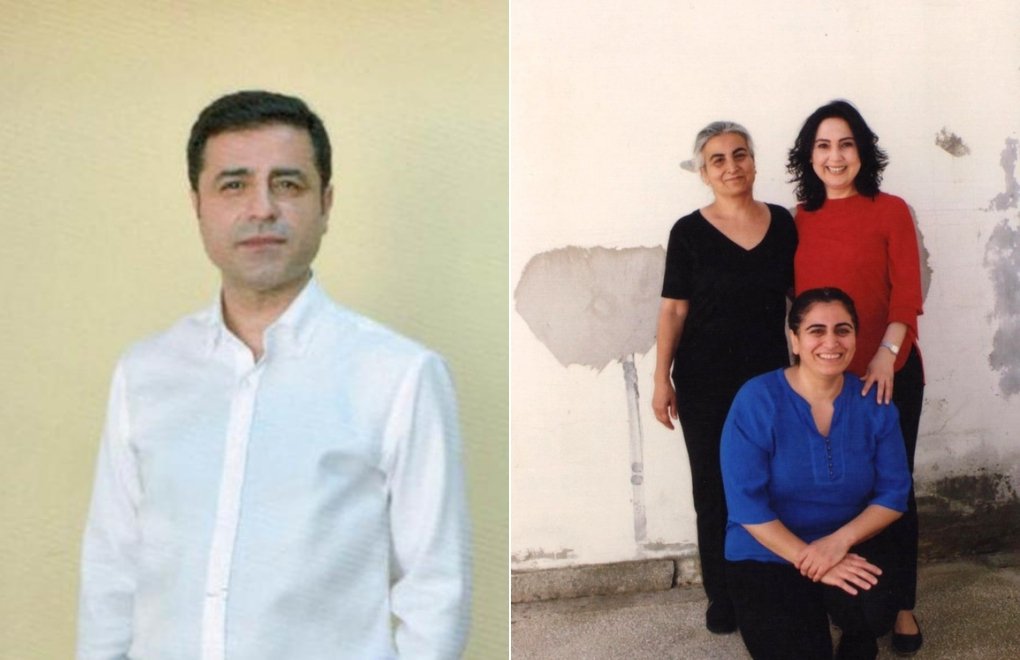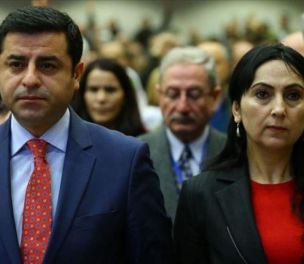Click to read the article in Turkish / Kurdish
Two international rights organizations, the Human Rights Watch (HRW) and ARTICLE 19, released a joint statement titled "Turkey: Opposition Politicians Detained for Four Years" today (November 19).
Referring to the "pattern of politically motivated prosecutions and detentions", the HRW and ARTICLE 19 have said: "The Turkish government should immediately release from detention Selahattin Demirtaş, former co-leader of the opposition Peoples' Democratic Party (HDP), in accordance with the 2018 judgment of the European Court of Human Rights (ECtHR)."
Indicating that "the detention of Demirtaş and eight other democratically elected HDP MPs four years ago this month was the start of the government's ongoing assault on the party," the statement has noted that it was also " part of a broader pattern of politically motivated prosecutions and incarcerations in the wake of the July 15, 2016 coup attempt."
"The Turkish government should also review the detentions of the other former HDP deputies, including the co-chair of the party, Figen Yüksekdağ, on whose cases the ECtHR has yet to rule," they have emphasized further.
'Government has distorted, perverted legal process'
Hugh Williamson, the Europe and Central Asia Director at the HRW, has briefly stated the following about the issue.
"Over the past four years the Turkish government has distorted and perverted the legal process to serve the political aim of keeping opposition politicians Selahattin Demirtaş, Figen Yüksekdağ, and other former HDP deputies locked up," he has said and briefly added:
"The Turkish government has misused detention and criminal proceedings in a campaign of persecution against Demirtaş in particular, including by flouting a European Court of Human Rights' order to release him and concocting new baseless charges to keep him behind bars."
"The Turkish government needs to carry out the long overdue release of Selahattin Demirtaş and comply with the decision of the ECtHR.
"The hand-in-glove coordination we have seen between President Erdoğan, prosecutors, and the Turkish courts to keep him behind bars in violation of his rights is a serious abuse of the rule of law and democratic safeguards."
'Shocking reminder of the power of the executive'
Commenting on the detention and prosecution of the politicians, Sarah Clarke, the Head of Europe and Central Asia at ARTICLE 19, has also said:
"The decision to lift immunity from prosecution for parliamentarians in Turkey has enabled serious attacks on democratic institutions in Turkey.
"The speeches of President Erdoğan concerning Demirtaş and the subsequent refusal of the court to release him, despite the ruling of the European Court of Human Rights, is a shocking reminder of the power of the executive in Turkey to influence court proceedings."
A brief overview of the last four yearsThe joint statement of the HRW and ARTICLE 19 has shared an overview of the last four years in terms of the prosecution and arrest of the politicians. Some highlights from this overview are as follows: "Selahattin Demirtaş and the others are being targeted because they led the Peoples' Democratic Party's political opposition to the government of President Recep Tayyip Erdoğan. Selahattin Demirtaş and Figen Yüksekdağ remain in detention in Edirne F-type and Kandıra F-type prison in western Turkey, respectively, and are among six former HDP members of parliament still in prison after being detained on November 4, 2016, and in one case a few weeks later, while they were serving deputies. They are held either in pretrial detention or are serving sentences. Their prosecutions were overwhelmingly based on their political speeches over the years. "On November 4, 2016, courts ordered the detention on terrorism charges of nine members of the party in parliament, including Demirtaş and Yüksekdağ, hours after police arrested them and three other party members serving in parliament in the middle of the night in a coordinated operation in various cities. "While serving parliament, members usually enjoy a high level of immunity from prosecution for their political activities in office; the arrest and detention of the HDP deputies is based on a controversial temporary constitutional amendment and parliamentary vote in May 2016 that lifted their parliamentary immunity. "Before parliament adopted the constitutional amendment, in 2015 and 2016 President Erdoğan had made several speeches pushing for them to be prosecuted and suggesting that the party should not be in parliament because it was indistinguishable from the armed PKK. International bodies including the Council of Europe's Venice Commission, which advises on constitutional matters, strongly criticized the way the deputies' parliamentary immunity was lifted. In individualized proceedings after they were detained en masse, the members of parliament stood trial on charges of 'membership of a terrorist organization,' 'spreading terrorist propaganda,' and many other crimes. "In all cases, the bulk of the prosecution's evidence consists of the defendants' public speeches and activities as politicians and in no case is there evidence of material connection with violent acts. As the trials have been taking place, President Erdoğan has made several speeches saying that Demirtaş and the others must remain in detention. "After exhausting domestic remedies, Demirtaş and the other deputies filed applications to the European Court of Human Rights regarding the removal of their parliamentary immunity and later concerning the legality of their detention. "On November 20, 2018, the European Court found in the case of Demirtaş v. Turkey (...) that 'It had been established beyond reasonable doubt that the extensions of Mr. Demirtaş' detention, especially during two crucial campaigns, the referendum and the presidential election, had pursued the predominant ulterior purpose of stifling pluralism and limiting freedom of political debate: the very core of the concept of a democratic society.' "Demonstrating the importance of the case, the Court made the rare ruling that there had been a violation of Article 18 of the European Convention, meaning that the extension of Demirtaş' detention had been pursued for ulterior purposes and as such was an abuse of power. This was the first time the Court found such a violation in relation to Turkey. "In a complicated sequence of events, described below, the Turkish government did not release Demirtaş from detention as the European Court's ruling required but instead expedited a conviction against him for a 2013 speech he had given and detained him again on new charges. The Turkish government and Demirtaş's lawyers referred the case to the European Court's Grand Chamber whose judgment, following a hearing on September 18, 2019, is pending. ARTICLE 19 and Human Rights Watch also submitted a joint third-party intervention before the Grand Chamber. "Two days after the Grand Chamber hearing, the Ankara prosecutor sought the detention of Demirtaş again in relation to another criminal investigation based on the same facts, which form part of the evidence in the ongoing main trial against him. Demirtaş has now been in detention for over four years." |
(HA/SD)













aaa.jpg)